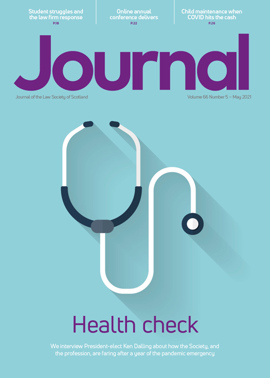Editorial
We now know who will form the next Scottish Government in the wake of the election, though we are no clearer about our constitutional future.
Amid the campaign hubbub about referendums and recovery, however, some other issues did surface. One that became something of a bandwagon was the future of the not proven verdict.
This curious feature of our criminal trials (which has been shown, contrary to supposition, not to have been the original Scottish acquittal verdict) sharply divides opinion. It also generates much misunderstanding. Opponents attack it as used by juries as a get-out from facing up to whether to convict, and blame it in particular for the low conviction rate in rape and analogous offences – though it has featured notoriously in other cases also. Defence lawyers claim, very plausibly, that its use indicates a doubt such that the only proper alternative is a not guilty verdict, even if a jury might hesitate to apply that term to the accused – yet the 2019 jury research report concluded that removing not proven might result in more guilty verdicts.
It has to be said, however, that the status quo is difficult to defend. Juries are told they have the choice of three verdicts, but are not allowed to have the two acquittal verdicts explained, except that they both have the same effect. It is not surprising that the 2019 research also found a level of confusion, for example that some jurors believe that not proven leaves open the possibility of a retrial.
Hence some senior voices within the profession also regard the present position as indefensible, such as the recently retired Lord Uist, who has written that the existence of two acquittal verdicts is “indefensible in logic and in common sense”. And hence the continuing campaign to abolish not proven, reflected in varying party election promises to do so or at least to review its future.
So change may be coming. But are there alternatives? A minority view, perhaps the legal purist position, is to have the two verdicts, proven or not proven. That, I suspect, would not resonate so readily with juries, who should at least have little difficulty with the concept of guilty/ not guilty. But I am initially attracted to one suggestion I saw recently, that we adopt the two verdicts of “proven guilty” and “not proven guilty”. That might help juries to focus on the correct legal approach, while providing two clear alternatives.
Some might question whether it would sit with the presumption of innocence. That, however, is also a criticism of the present position. The alternative of course is guilty and not guilty, which brings us back to where we came in. We do not live in a perfect world.






